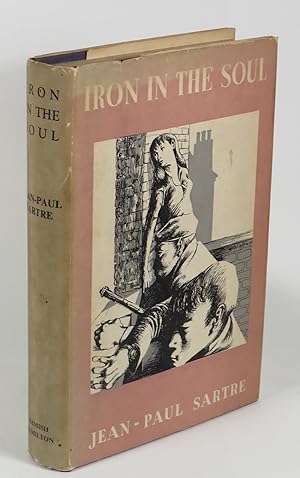
Iron in the Soul by Jean-Paul Sartre (1950)
Check my rate
| Main centres: | 1-3 business days |
| Regional areas: | 3-4 business days |
| Remote areas: | 3-5 business days |

| Main centres: | 1-3 business days |
| Regional areas: | 3-4 business days |
| Remote areas: | 3-5 business days |
Published by Hamish Hamilton, 1950, haedcover, 379 pages, some edgeware to dust jacket otherwise condition: very good.
The Roads to Freedom (French: Les chemins de la liberté) is a series of novels by French author Jean-Paul Sartre. Intended as a tetralogy, it was left incomplete, with only three complete volumes and part one of the fourth volume of the planned four volumes published in his lifetime and the unfinished second part of the fourth volume was edited and published a year after his death.
La mort dans l'âme (Troubled Sleep) was originally translated by Gerard Hopkins as Iron in the Soul, This is the year of the first edition in translation.
The novels were written largely in response to the events of World War II and the Nazi occupation of France, and express certain significant shifts in Sartre's philosophical position towards 'engagement' (commitment) in both life and literature, finding their resolution in the extended essay L'existentialisme est un humanisme (Existentialism is a Form of Humanism).
Jean-Paul Sartre was a French philosopher, playwright, novelist, screenwriter, political activist, biographer, and literary critic, considered a leading figure in 20th-century French philosophy and Marxism. Sartre was one of the key figures in the philosophy of existentialism (and phenomenology). His work has influenced sociology, critical theory, post-colonial theory, and literary studies. He was awarded the 1964 Nobel Prize in Literature despite attempting to refuse it, saying that he always declined official honors and that "a writer should not allow himself to be turned into an institution."
Sartre held an open relationship with prominent feminist and fellow existentialist philosopher Simone de Beauvoir. Together, Sartre and de Beauvoir challenged the cultural and social assumptions and expectations of their upbringings, which they considered bourgeois, in both lifestyles and thought. The conflict between oppressive, spiritually destructive conformity (mauvaise foi, literally, 'bad faith') and an "authentic" way of "being" became the dominant theme of Sartre's early work, a theme embodied in his principal philosophical work Being and Nothingness (L'Être et le Néant, 1943). Sartre's introduction to his philosophy is his work Existentialism Is a Humanism (L'existentialisme est un humanisme, 1946), originally presented as a lecture.